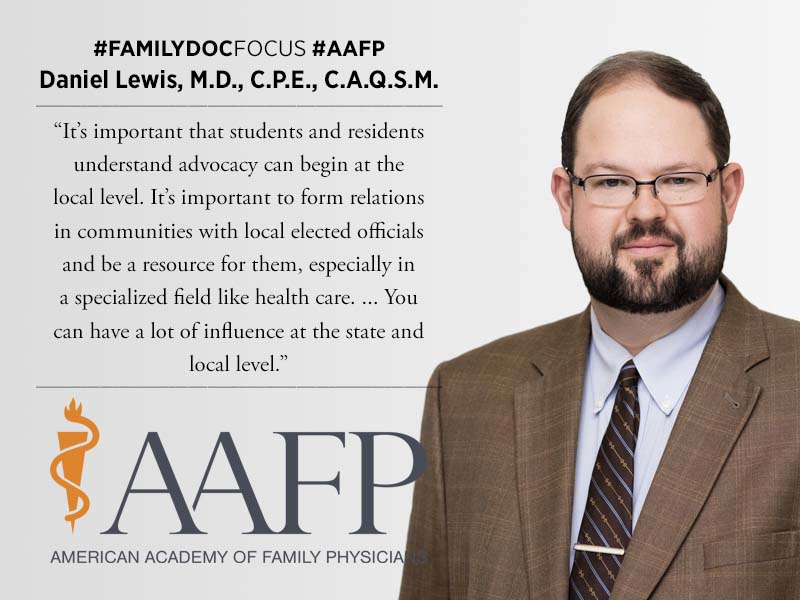COVID Ordeal Reinforced State Leader’s Role as Advocate
June 21, 2021, 3:10 p.m. David Mitchell — COVID-19 nearly silenced Daniel Lewis, M.D., C.P.E., C.A.Q.S.M. Now he’s speaking out louder than ever on issues that affect patients, primary care and public health.

“I never set out to be a voice on TV or radio,” said Lewis, whose hospitalization and recovery made national news early in the pandemic. “I wouldn’t have chosen to go through that experience to gain this perspective, but now that it’s here, I don’t want it to go to by the wayside. We’ll see where it leads. I want to continue my advocacy efforts on the state and national level. It’s reinforced the idea that this is where I need to be.”
Ironically, Lewis ― vice president and chief medical officer with Ballad Health, a regional health system that serves patients throughout northeast Tennessee, southwest Virginia, northwest North Carolina and southeast Kentucky ― likely was exposed to SARS-CoV-2 during a meeting in mid-March that was convened to discuss how to prevent coronavirus from spreading in the medical center.
Lewis received positive test results for coronavirus on March 30 and found himself, briefly, a patient in his own Tennessee hospital, Greeneville Community Hospital, subject to isolation protocols he helped implement. He was subsequently transferred to the COVID-19 wing at Johnson City Medical Center, where he had once been a medical student. He stayed for more than a month, including 10 days on a ventilator.
“It’s easy to get wrapped up in work, and the work we do as family physicians is incredibly important because a lot of folks rely on us,” said Lewis, who has five children ages 8 to 18. “Yet, you have to make time for yourself and family. Realizing the peril I was in with COVID, the danger it put me in ― truly fighting for my life ― helped give me perspective on what’s really important. I’ve tried to keep my priorities in order and maintain my health and relationships with family better than I had done previously.”
Lewis’ near-death experience at age 42 also got the attention of the community he has served for more than a decade.
“I’ve received multiple comments and calls from people who said they were taking the virus seriously where they had not before I got sick,” he said. “They saw what I went through. That helped initially with social distancing and mask-wearing. It’s also helped with vaccinations to some extent. My experience made me more effective regarding COVID than I would have been otherwise.”
Lewis will share more about his experience when he speaks July 30 during the virtual FUTURE, formerly National Conference of Family Medicine Residents and Medical Students.
“The message I really want students and residents to hear is about the power of their voices and advocacy efforts,” said Lewis, who has served as a student delegate to the AAFP’s Congress of Delegates, resident chair of National Conference and resident member of the Academy’s Board of Directors. “People are looking for trusted sources of information.
“As a family physician involved in my community, I had a broad reach. My own patients, their families and even members of the community at large who don’t see me for their medical care would listen to my opinions and perspectives, and I think we had great influence. I think the advocacy students, residents and family physicians can do can be far-reaching and important.”
And that’s not limited to COVID-19.
“There are other issues facing us in this country, and we need their voices and advocacy,” Lewis said. “I want them to understand what a platform a family medicine career gives them in reaching out to others and being a trusted source of information.”
Lewis said family physicians can be that trusted source not only for patients, the public and media, but also for policymakers.
“It’s important that students and residents understand advocacy can begin at the local level,” said Lewis, who is president of the Tennessee AFP and that chapter’s alternate delegate to the COD, as well as a member of the AAFP’s Commission on Education and the Academy’s Work Group on Rural Health. “It’s important to form relations in communities with local elected officials and be a resource for them, especially in a specialized field like health care. It’s a different world than they are used to. You can have a lot of influence at the state and local level.”